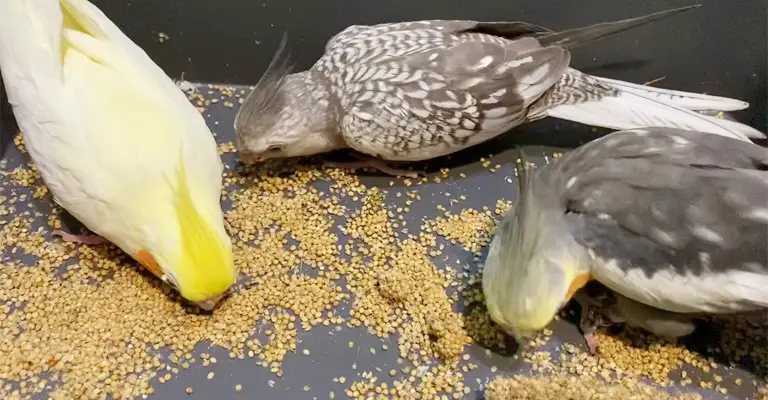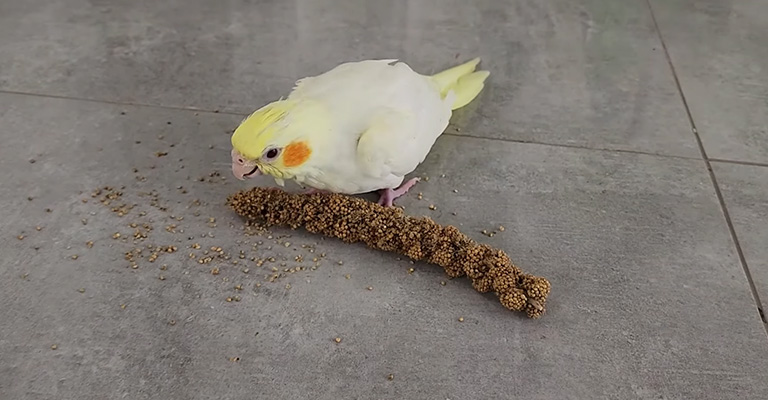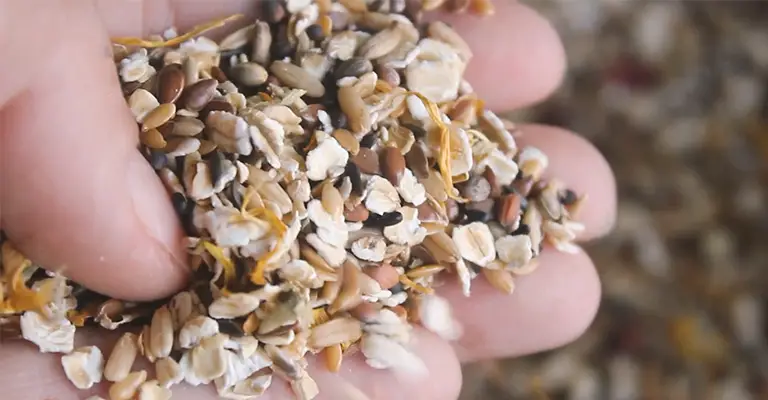Cockatiels, with their charming personalities and unique characteristics, are among the most popular pet birds worldwide. However, newcomers to the world of avian companionship might occasionally encounter a perplexing situation: “Why does my cockatiel not know how to eat seeds?”
Seed-based diets are often associated with birds like cockatiels, but it’s essential to understand that these birds may not instinctively know how to eat seeds, especially if they’ve been raised on a different diet.
Young cockatiels, hand-raised on a formula diet, may not have had the opportunity to learn this skill from their parents or flock members.
In this exploration, we will delve into the reasons behind a cockatiel’s hesitation or difficulty in eating seeds, including their upbringing, exposure to other foods, and potential health factors.
Understanding these factors is crucial in helping your feathered friend adapt to a balanced diet and ensure their overall well-being.

Why Does My Cockatiel Not Know How To Eat Seeds?
Cockatiels are known for their diverse dietary preferences, which may include seeds. However, some cockatiels might not know how to eat seeds due to various reasons.
Here are some potential explanations:
Early Diet
If a cockatiel was hand-raised and primarily fed a formula diet instead of seeds during its critical developmental stage, it may not have learned the natural seed-cracking behavior.
Limited Exposure
Birds raised in isolation or without exposure to other birds might not have observed seed-eating behavior as they would in a flock or with adult birds.
Preference for Other Foods
Cockatiels have individual tastes, and some may simply prefer other foods like pellets, fruits, or vegetables over seeds. They might not show interest in something that doesn’t appeal to their taste.
Health Issues
Dental or beak problems can make it physically challenging for cockatiels to crack seeds. These issues may deter them from trying or make it difficult to eat seeds properly.
Seed Size
Cockatiels may struggle with larger seed varieties. Some birdseed mixes contain seeds that are too big for them to crack comfortably, making it harder for them to access the nutritious inner parts.
Environmental Stress
Stressors in the bird’s environment, such as loud noises or frequent disturbances, can affect their appetite and willingness to explore new foods like seeds.
Age
Young cockatiels may not immediately understand how to open seeds, but they can learn through observation and practice as they grow older.
Lack of Social Learning:
Cockatiels often learn from observing their flock members or parents. A single bird raised in isolation may not have the opportunity to witness seed-cracking behavior.
Negative Associations
If a cockatiel had a negative experience with seeds in the past, such as choking on a seed, they may develop an aversion to them.
There are various factors that can contribute to a cockatiel not knowing how to eat seeds. It’s essential to consider these factors, offer a balanced diet, and provide opportunities for learning and exploration to ensure your bird’s nutritional needs are met.
If you have concerns, consult with an avian veterinarian for guidance on improving your cockatiel’s diet and overall health.
At What Age Do Cockatiels Start Eating Seeds?

Cockatiels are seed-eating birds, but they do not start eating seeds right away. They go through different stages of development and diet before they can eat seeds.
Here are five ages when cockatiels start eating seeds and what they eat at each stage:
Hatchling (0 to 10 days old)
Hatchlings are the newly hatched cockatiels that are still in the nest with their parents. They are blind, naked, and helpless, and they depend on their parents for warmth, protection, and food.
Hatchlings do not eat seeds, but they eat a special substance called crop milk that their parents produce in their crops (a pouch in their throat) and regurgitate for them.
Crop milk is rich in protein, fat, antibodies, and enzymes, and it helps the hatchlings grow and develop rapidly.
Nestling (10 to 21 days old)
Nestlings are the young cockatiels that are still in the nest with their parents, but they start to develop feathers, eyesight, and mobility.
They are still dependent on their parents for food, but they start to eat some solid food along with crop milk.
Nestlings do not eat seeds yet, but they eat soft foods that their parents chew and regurgitate for them, such as fruits, vegetables, cooked eggs, or baby bird formula.
These foods provide them with more vitamins, minerals, and fiber than crop milk alone.
Fledgling (21 to 35 days old)
Fledglings are young cockatiels that leave the nest, start to explore their surroundings, and learn to fly.
They are still fed by their parents, but they also start to feed themselves and try new foods. Fledglings start to eat some seeds at this stage, but they also eat pellets, fruits, vegetables, cooked eggs, or baby bird formula.
These foods provide them with a balanced and varied diet that supports their growth and development.
Weaning (35 to 56 days old)
Weaning is the process of transitioning from being fed by the parents to being independent and eating on their own. Weaning is a gradual and individual process that varies from bird to bird.
Some cockatiels may wean earlier or later than others, depending on their personality and environment. Weaning cockatiels eat mostly seeds at this stage, but they also need pellets, fruits, vegetables, cooked eggs, or baby bird formula to supplement their diet.
These foods provide them with the nutrients they need to become healthy and strong adults.
Adult (56 days old and above)
Adult cockatiels are fully grown and independent birds that can eat on their own and do not need their parents anymore.
Adult cockatiels eat mainly seeds as their staple food, but they also need pellets, fruits, vegetables, cooked eggs, or treats to enrich their diet.
These foods provide them with the nutrients they need to maintain their health and well-being throughout their life.
What To Do If My Cockatiel Does Not Know How To Eat Seeds?

Seeds are a natural and important part of a cockatiel’s diet, but not all cockatiels are familiar with them.
There are many possible reasons why your Cockatiel does not know how to eat seeds, such as being young, inexperienced, used to pellets, or having a health or behavioral problem.
If you want to teach your Cockatiel how to eat seeds, here are some tips that may help you:
Choose High-Quality And Organic Seeds
You should choose high-quality and organic seeds that are fresh, clean, and free of pesticides, preservatives, or additives.
You can buy them from reputable pet stores or online shops, or you can use human-grade seeds from health food stores or supermarkets.
Some examples of seeds that are suitable for cockatiels are millet, quinoa, oats, barley, wheat, rye, flax, sesame, and hemp.
Mix Different Types Of Seeds
You should mix different types of seeds to provide your Cockatiel with a variety of nutrients, flavors, and textures. You can follow a recipe or create your own mix according to your Cockatiel’s preferences.
A general guideline is to use about 50% millet, 25% other small seeds, and 25% other large seeds. You can also add some nuts, such as almonds, walnuts, or pistachios, for extra protein and fat.
Offer The Seed Mix In A Shallow Dish Or Bowl
You should offer the seed mix in a shallow dish or bowl that is easy for your Cockatiel to access and see.
You should place the dish or bowl near your Cockatiel’s perch or favorite spot in the cage. You should also make sure that the dish or bowl is clean and stable.
Introduce The Seed Mix Gradually And Patiently
You should introduce the seed mix gradually and patiently to your Cockatiel, as it may take some time for it to accept and try new foods.
You can start by offering a small amount of seed mix along with its regular food, such as pellets, fruits, vegetables, or baby bird formula.
You can gradually increase the amount of seed mix and decrease the amount of regular food until your Cockatiel eats mostly seeds.
Show Your Cockatiel How To Eat Seeds
You should show your Cockatiel how to eat seeds by demonstrating and encouraging it.
You can do this by eating some seeds yourself in front of your Cockatiel, making positive sounds and gestures, or offering some seeds from your hand or mouth to your Cockatiel’s beak.
You can also use another bird that knows how to eat seeds as a role model for your Cockatiel.
Praise And Reward Your Cockatiel For Eating Seeds
You should praise and reward your Cockatiel for eating seeds by giving them positive feedback and treats.
You can do this by saying its name and words it knows, such as “good bird” or “yummy,” clapping your hands or whistling softly, or offering it some fruits, vegetables, cooked eggs, or millet spray as treats.
Monitor Your Cockatiel’s Weight And Health
You should monitor your Cockatiel’s weight and health by weighing it regularly and checking its droppings and feathers for any signs of problems.
You can use a digital scale to weigh your Cockatiel every week and keep a record of its weight changes.
You can also check its droppings for any changes in color, consistency, or quantity.
Provide Fresh Water And Grit For Your Cockatiel
You should provide fresh water and grit for your Cockatiel to help it digest the seeds properly.
Water helps your Cockatiel to swallow the seeds and stay hydrated. Grit helps your Cockatiel grind the seeds in its gizzard (a muscular organ in its stomach) and extract the nutrients from them.
You should offer fresh water in a clean bottle or bowl that is easy for your Cockatiel to drink from.
Consult Your Veterinarian For More Advice
You should consult your veterinarian for more advice on how to teach your Cockatiel how to eat seeds, how to feed, and what not to feed to your Cockatiel.
Your veterinarian can examine your Cockatiel and recommend the best diet and nutrition for its age, health, and needs.
Your veterinarian can also diagnose and treat any health problems or disorders that may affect your Cockatiel’s ability or willingness to eat seeds.
FAQ
Cockatiels may not know how to eat seeds if they were hand-raised on a formula diet or introduced to other foods early on. They often learn seed-eating behavior from their flock or parents, which they might not have had the opportunity to do.
Yes, cockatiels can learn to eat seeds through patient training. Gradually introduce seeds alongside their regular diet and use positive reinforcement to encourage them to try seeds.
Cockatiels can thrive on a diet that doesn’t rely heavily on seeds. In fact, a seed-only diet can lead to nutritional imbalances. It’s more important to provide a diverse diet that includes pellets, fruits, vegetables, and occasional seeds.
If your Cockatiel resists seeds, don’t force the issue. Focus on offering a balanced diet and consult an avian veterinarian if you have concerns about their nutritional intake or overall health.
Yes, a cockatiel’s food preferences can evolve. Some may become more accepting of seeds as they observe other birds or learn to recognize them as a treat. Be patient and persistent in offering a variety of foods to encourage a balanced diet.
Conclusion
The question of why a cockatiel may not know how to eat seeds underscores the importance of providing proper care and a diverse diet for our avian companions.
As we’ve explored, several factors can contribute to a cockatiel’s difficulty in consuming seeds, from their early diet experiences to health issues.
To address this issue, it’s essential to offer a variety of foods, gradually introducing seeds and other healthy options like pellets, fresh fruits, and vegetables. Patience and consistency are key in helping your Cockatiel adapt to a balanced diet.
While seed-based diets can be part of their menu, a well-rounded approach ensures that your feathered friend receives the nutrients they need to thrive.
Remember, each bird is unique, so tailoring their diet to their individual preferences and requirements is the key to a happy and healthy life together.